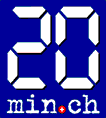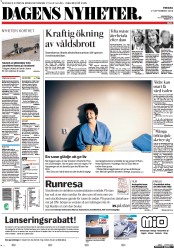
Geneva, Switzerland
info@astonesthrow.ch

Size Counts -- Tabloids Lead the Way
The news that the once mighty Blick has been dethroned by a free tabloid as newspaper circulation leader in Switzerland is sure to have ramifications far outside Swiss borders. If ever there was a case of "If it can happen there, it can happen here" then this has to be it.
 The free tabloid, 20
Minutes has only been on the Swiss scene since December, 1999. It is
aimed at the young commuter with some 30 pages of short news items and
lots of advertising suggesting where the reader should spent his/her
money. Take a look here at their web
site and you'll get a very good feel for the type of product it is
(Automatic translate from Google, for instance, does an adequate job
putting the site into English).
The free tabloid, 20
Minutes has only been on the Swiss scene since December, 1999. It is
aimed at the young commuter with some 30 pages of short news items and
lots of advertising suggesting where the reader should spent his/her
money. Take a look here at their web
site and you'll get a very good feel for the type of product it is
(Automatic translate from Google, for instance, does an adequate job
putting the site into English).
Blick, owned by
Ringier, Switzerland's largest publishing house, couldn't compete on price
but management did decide they could compete on size. And thus in June,
after a six-week trial of ![]() printing both broadsheet and tabloid, it decided
size did matter, and based on reader preference became a tabloid only.
Ringier has not yet said what has happened to circulation in the two
months since only the tabloid has been sold.
printing both broadsheet and tabloid, it decided
size did matter, and based on reader preference became a tabloid only.
Ringier has not yet said what has happened to circulation in the two
months since only the tabloid has been sold.
The move to tabloid is happening all over Europe. The most remarkable transformation is in the UK where the Independent switched from broadsheet to tabloid in May after a few months of printing both sizes. Circulation has increased 18% to 261,000. At The Scotsman, a move to tabloid in August resulted in a one-month 11% circulation increase.
Media Buying Agencies Dispute Rate Cards
The Times of London is undergoing a similar exercise although it continues to print both sizes, a costly affair. Both the Times and Independent faced an obstacle they didn't expect -- that media buying agencies objected to the tabloid advertising rate card. At the Independent a new rate card has now been agreed but the squabble means the expected 2005 breakeven target for the Independent may get pushed back.
That fight with the media buying agencies has hit the Times even harder with advertisers angry over the added cost of putting ads into both the broadsheet and the tabloid. The Times took a small step just this week to stop straddling the fence by deciding that the Times in Scotland and Ireland will now print only as a tabloid. But those are small numbers -- in Ireland, for instance, it has daily circulation of 4,686 copies plus some 6,300 copies in Northern Ireland.
But perhaps the most interesting market for checking out tabloid success is Germany. For several years now the German newspaper market has been in the doldrums -- advertising seriously down that in turn has led to severe cost cuts and not much investment.
Rumors abound that Axel Springer, publisher of circulation leader Bild Zietung, is planning a tabloid version (could that be why a new editor was appointed this week?) Springer has had good success with Welt Kompakti, a tabloid version of the well respected Die Welt. Welt Kompakti has most of the articles of the broadsheet, but much shorter; it is 32 pages and it is aimed directly at the young reader.
You Can Charge For Tabloids Aimed At Young
But in an interesting twist, Welt Kompakti is NOT free like 20 Minutes and the Metro newspapers. It sells for 50 Euro cents (60 US cents) -- a 60% reduction over Die Welt's price -- but at least Axel Springer is showing you can charge the young to read newspapers -- but not too much and it still must be an interesting read.
Springer has declared the tests in Frankfurt and
Berlin a success and started distribution in Munich this week. Cologne
starts in October and other cities are to follow.
In Frankfurt the very respected business broadsheet daily Handelsblatt has launched the tabloid News. The News will use very shortened stories not just from Handelsblatt but also from Tagesspiegel in Berlin. To relate to the young, the newspaper plans to incorporate Internet voting and mobile phone messaging. It, too, sells for 50 Euro cents (60 US cents), again making the break from giving such a newspaper away.

Meanwhile, back in England, The York Evening Press used the oldest of news purveyors, the town crier, to march through the streets of York to announce news of its new format -- tabloid.
The old and the new truly march together.
© Philip M. Stone of Stone & Associates, a partner in followthemedia.com
